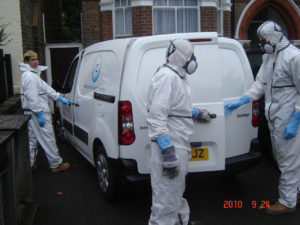Death Cleanup: Restoring Dignity and Peace through Profound Work
In the darkest moments of life, there are heroes who step forward to provide solace and restoration. One such group of unsung heroes operates in the field of unattended death cleanup, a vital but often misunderstood profession. In this blog post, we will embark on a journey into the world of death cleanup, uncovering the profound significance of this service. We will delve into the unique challenges these professionals face, the empathetic approach they adopt, and how their work plays a pivotal role in restoring dignity and peace to those affected by tragedy.
The Weight of Tragedy: The Need for Death Cleanup
When tragedy strikes, the aftermath is often overwhelming. Whether it’s an unattended death, a violent crime, or the discovery of human remains, the scene left behind is fraught with emotional and physical challenges. This is where the crucial role of death cleanup becomes evident.
The Profound Nature of Death Cleanup
CSI is not just about removing physical remnants; it’s about providing a sense of closure and healing to those affected. It involves a multifaceted approach that includes:
1. Removal of Biological Materials: Death cleanup professionals must meticulously remove and disinfect biological materials like blood, bodily fluids, and tissue. Their work ensures that any potential biohazards are eradicated, safeguarding the health of those who inhabit the space.
2. Restoration of the Environment: Beyond cleaning, these professionals restore the physical environment. They repair or replace damaged surfaces, ensuring that the area is safe and habitable once more.
3. Psychological and Emotional Support: Dealing with the aftermath of a death can be emotionally harrowing. Death cleanup professionals approach their work with empathy, offering emotional support to those affected and connecting them with necessary resources for coping and healing.
Challenges Faced in Death Cleanup
The work of death clean up is not for the faint-hearted. These professionals encounter unique challenges that require strength, resilience, and a deep well of compassion.
1. Emotional Toll: Death cleanup often involves working in emotionally charged environments. Dealing with grieving family members or survivors can be emotionally taxing, and professionals must approach such situations with sensitivity.
2. Biological Hazards: The potential exposure to biohazards poses a significant risk. Professionals need to be equipped with the knowledge and protective gear necessary to ensure their safety.
3. Legal Regulations: Various legal regulations, including OSHA guidelines and state-specific laws, govern the cleanup of biohazardous scenes. Death cleanup professionals must navigate these regulations to ensure compliance and safety.

Suicide Cleanup CSI Illinois
The Human Aspect of Death Clean up
While the technical aspects of death cleanup are crucial, the human element is equally significant. Professionals in this field provide more than just cleaning; they offer support, understanding, and a sense of closure.
1. Empathy and Compassion: Death clean up professionals understand the emotional turmoil that families and survivors are going through. Their work is not solely about physical cleanup but also about offering compassion and empathy during difficult times.
2. Restoring Dignity: The work of death cleanup is about restoring the dignity of the deceased and the peace of mind of the living. It allows families to begin the process of healing and moving forward.
The Importance of Specialized Training and Equipment
Death cleanup professionals undergo rigorous training to handle the emotional and physical challenges of their work. Their training covers not only the technical aspects but also the psychological and emotional aspects of dealing with death scenes. Additionally, they use specialized equipment, including personal protective gear and cleaning agents designed for biohazard removal.
Emerging from the Shadows
The work of death cleanup professionals has long been obscured from public view. However, as society becomes more aware of the importance of their services, these professionals are stepping into the light to receive the recognition they truly deserve.
The Profound Impact: CSI Crime Scene is not just a job; it’s a vocation that leaves a lasting impact on those it serves. It provides a sense of closure and healing to those who have experienced tragedy, allowing them to move forward.
Final Word
Crime Scene Cleaners is a profession that embodies the true essence of compassion and humanity. It is about far more than just cleaning; it’s about restoring dignity, peace, and hope to those affected by tragedy. The work of death cleanup professionals is a testament to the indomitable human spirit, shining brightly even in the darkest of times. As a society, it is our duty to recognize and appreciate these unsung heroes who make a profound difference in the lives of those they serve. In understanding the significance of death cleanup, we acknowledge the importance of empathy, resilience, and the power of restoration in the face of adversity.
